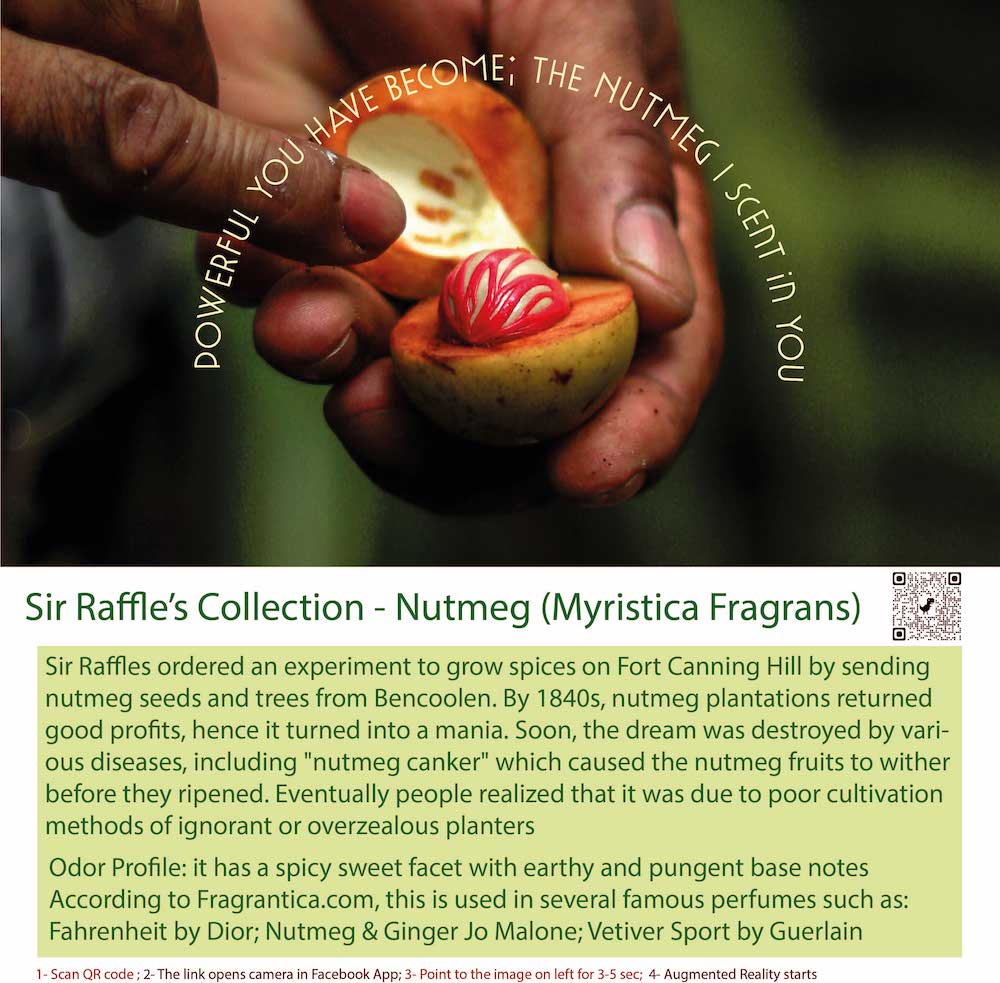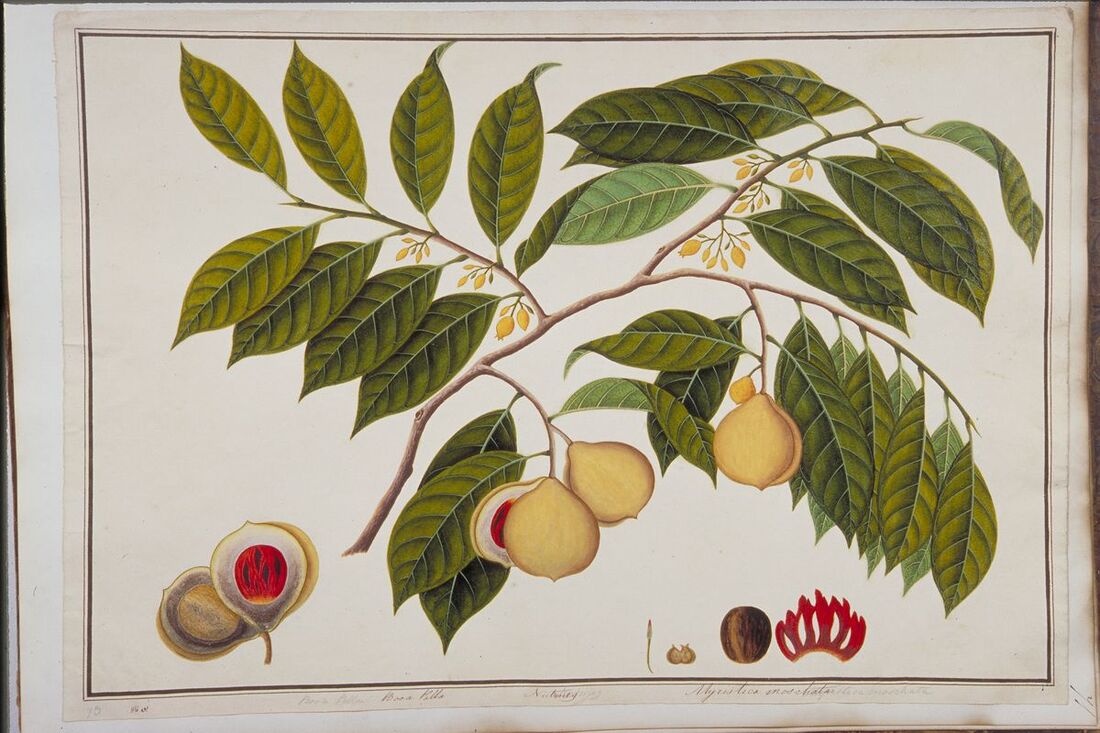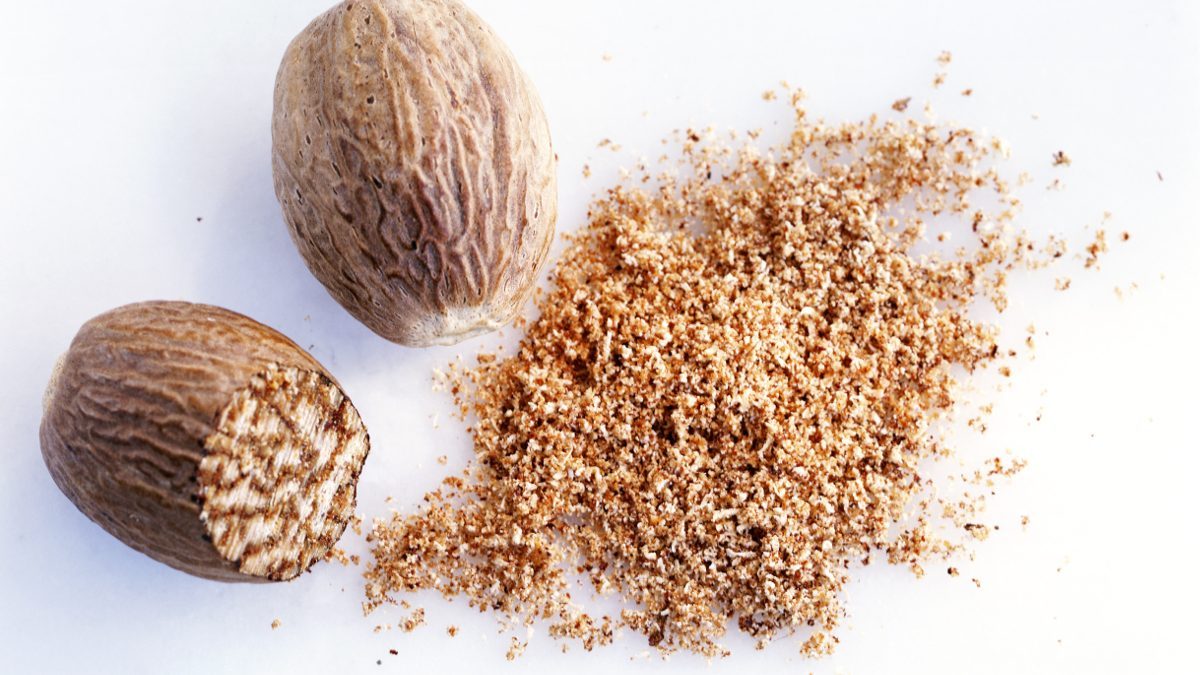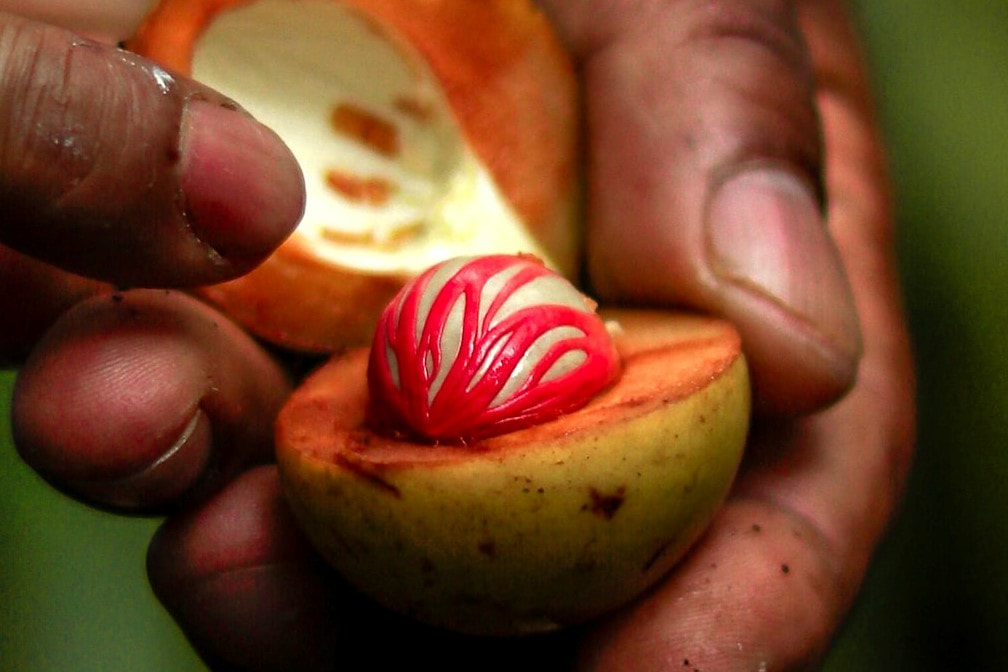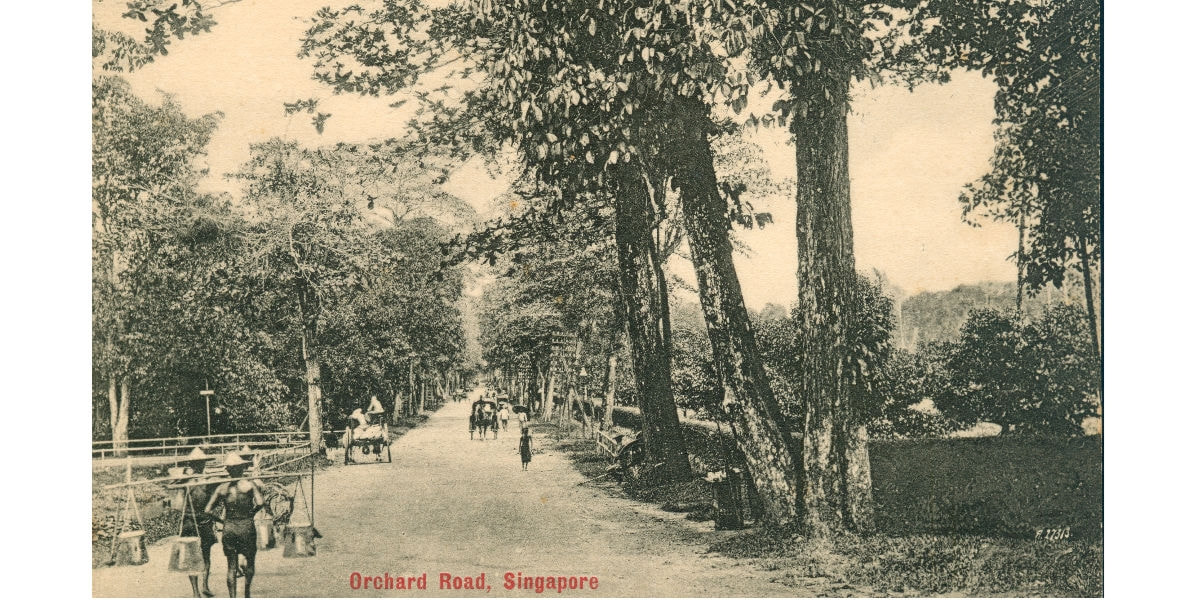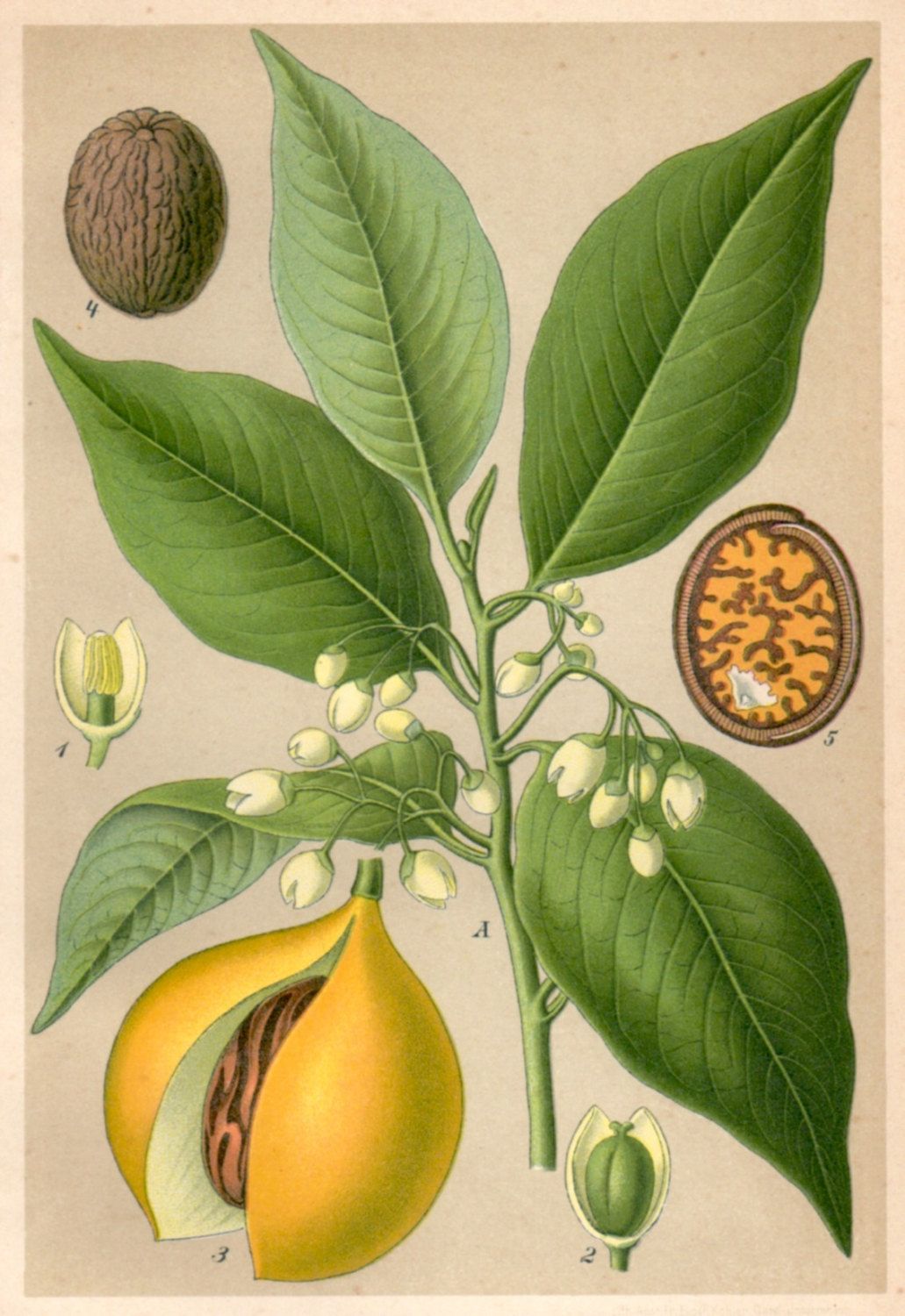Unveiling the Essence of Nutmeg: A Luxurious Male Fragrance
Nutmeg, a highly aromatic spice derived from the seed of the Myristica fragrans tree, has a long history of use in the perfume world. Native to the Banda Islands of Indonesia, nutmeg has been treasured for centuries for its unique and captivating fragrance. The nutmeg tree produces both nutmeg and mace, with the former being the seed kernel, and the latter being the red, lacy covering of the seed.
In perfumery, nutmeg is valued for its warm, sweet, and spicy scent, which adds depth and complexity to fragrances. The aroma of nutmeg is often described as having a woody, balsamic undertone with notes of clove and cinnamon. Its alluring and comforting fragrance makes it a popular ingredient in both classic and contemporary perfumes.
The use of nutmeg in perfumery can be traced back to ancient civilizations. In ancient Egypt, nutmeg was considered a precious and valuable spice, and it was often used in religious ceremonies and rituals. The Greeks and Romans also used nutmeg in perfumes and as incense, appreciating its aromatic qualities.
Throughout history, nutmeg has been traded along spice routes and has played a significant role in shaping global trade and exploration. Its allure and desirability led to its high demand in Europe during the Middle Ages, and its scarcity and high price made it a symbol of status and luxury.
In the modern perfume world, nutmeg continues to be a cherished ingredient in both men's and women's fragrances. It is often used in oriental and woody compositions, where its warm and spicy notes create a rich and inviting aroma. Nutmeg blends well with a wide range of other aromatic ingredients, including citrus, florals, woods, and resins, making it a versatile and sought-after element in perfumery.
Perfumers use various techniques to extract nutmeg's essential oil and aromatic compounds. Steam distillation is commonly employed to obtain the essential oil from the crushed nutmeg seeds. The resulting oil is then used as a base or heart note in fragrances, contributing to the overall scent profile and longevity of the perfume.
Nutmeg's fragrance is not only captivating but also has been associated with various therapeutic properties. In traditional medicine, nutmeg has been used for its calming and aphrodisiac effects, making it a popular ingredient in aromatherapy and massage oils.
Nutmeg's warm, sweet, and spicy fragrance has been treasured for centuries, making it a prized ingredient in the perfume world. Its aromatic allure and historical significance in trade and exploration have cemented its place as a valuable and cherished spice. Whether used as an ancient incense in religious ceremonies or as a contemporary note in modern perfumes, nutmeg continues to captivate and inspire with its delightful and comforting scent.
In perfumery, nutmeg is valued for its warm, sweet, and spicy scent, which adds depth and complexity to fragrances. The aroma of nutmeg is often described as having a woody, balsamic undertone with notes of clove and cinnamon. Its alluring and comforting fragrance makes it a popular ingredient in both classic and contemporary perfumes.
The use of nutmeg in perfumery can be traced back to ancient civilizations. In ancient Egypt, nutmeg was considered a precious and valuable spice, and it was often used in religious ceremonies and rituals. The Greeks and Romans also used nutmeg in perfumes and as incense, appreciating its aromatic qualities.
Throughout history, nutmeg has been traded along spice routes and has played a significant role in shaping global trade and exploration. Its allure and desirability led to its high demand in Europe during the Middle Ages, and its scarcity and high price made it a symbol of status and luxury.
In the modern perfume world, nutmeg continues to be a cherished ingredient in both men's and women's fragrances. It is often used in oriental and woody compositions, where its warm and spicy notes create a rich and inviting aroma. Nutmeg blends well with a wide range of other aromatic ingredients, including citrus, florals, woods, and resins, making it a versatile and sought-after element in perfumery.
Perfumers use various techniques to extract nutmeg's essential oil and aromatic compounds. Steam distillation is commonly employed to obtain the essential oil from the crushed nutmeg seeds. The resulting oil is then used as a base or heart note in fragrances, contributing to the overall scent profile and longevity of the perfume.
Nutmeg's fragrance is not only captivating but also has been associated with various therapeutic properties. In traditional medicine, nutmeg has been used for its calming and aphrodisiac effects, making it a popular ingredient in aromatherapy and massage oils.
Nutmeg's warm, sweet, and spicy fragrance has been treasured for centuries, making it a prized ingredient in the perfume world. Its aromatic allure and historical significance in trade and exploration have cemented its place as a valuable and cherished spice. Whether used as an ancient incense in religious ceremonies or as a contemporary note in modern perfumes, nutmeg continues to captivate and inspire with its delightful and comforting scent.
To experience augmented reality, please open the Facebook-app using QR code and point to the image below
Crafted for Elegance: The Scentopia Singapore Men's Perfume Collection
Nutmeg, with its warm and comforting aroma, has the remarkable ability to evoke memories of holidays, eggnog, pumpkin pie, and various other delightful associations. It is often linked to celebratory times and happiness, but beneath its pleasant facade lies one of the saddest stories in the history of spices.
The gruesome and grisly tale of nutmeg's history revolves around the Banda Islands in Indonesia, which were the primary source of nutmeg during the colonial era. The Dutch East India Company, a powerful trading entity, sought to monopolize the nutmeg trade, leading to a dark and tragic chapter in the islands' history.
In their pursuit of control over the lucrative spice, the Dutch were ruthless in their approach, resorting to torture, massacre, and other atrocities against the native people of the Banda Islands. The indigenous Bandanese people were subjected to violent subjugation and exploitation, as the Dutch sought to maintain their monopoly on the valuable nutmeg trade.
The Dutch East India Company's aggressive tactics in the Banda Islands were met with fierce resistance from the Bandanese people, who fought bravely to protect their land and resources. Unfortunately, they faced overwhelming force from the Dutch, resulting in the loss of countless lives and the decimation of their culture and way of life.
The Dutch dominance over the nutmeg trade extended beyond the Banda Islands, affecting other countries and regions as well. Competing colonial powers and traders sought to gain control over nutmeg-producing territories, leading to conflicts and bloodshed in various parts of the world.
In addition to the violence and oppression inflicted on native populations, the quest for nutmeg also played a significant role in shaping the course of global trade and exploration during the Age of Discovery. Nutmeg, along with other valuable spices, drove European nations to seek new sea routes and territories, leading to the discovery of new lands and the colonization of distant lands.
The sad history of nutmeg serves as a stark reminder of the dark side of human ambition and the destructive consequences of the pursuit of wealth and power. Despite its association with celebratory times, nutmeg's past is marred by a trail of bloodshed, exploitation, and suffering that should not be forgotten.
Today, nutmeg continues to be a cherished spice used in fragrances, culinary creations and beverages worldwide. However, it is essential to remember the tragic history that lies behind this seemingly innocuous spice and to reflect on the lessons it offers about the complexities of human history and the need for empathy and understanding in our interactions with others.
The gruesome and grisly tale of nutmeg's history revolves around the Banda Islands in Indonesia, which were the primary source of nutmeg during the colonial era. The Dutch East India Company, a powerful trading entity, sought to monopolize the nutmeg trade, leading to a dark and tragic chapter in the islands' history.
In their pursuit of control over the lucrative spice, the Dutch were ruthless in their approach, resorting to torture, massacre, and other atrocities against the native people of the Banda Islands. The indigenous Bandanese people were subjected to violent subjugation and exploitation, as the Dutch sought to maintain their monopoly on the valuable nutmeg trade.
The Dutch East India Company's aggressive tactics in the Banda Islands were met with fierce resistance from the Bandanese people, who fought bravely to protect their land and resources. Unfortunately, they faced overwhelming force from the Dutch, resulting in the loss of countless lives and the decimation of their culture and way of life.
The Dutch dominance over the nutmeg trade extended beyond the Banda Islands, affecting other countries and regions as well. Competing colonial powers and traders sought to gain control over nutmeg-producing territories, leading to conflicts and bloodshed in various parts of the world.
In addition to the violence and oppression inflicted on native populations, the quest for nutmeg also played a significant role in shaping the course of global trade and exploration during the Age of Discovery. Nutmeg, along with other valuable spices, drove European nations to seek new sea routes and territories, leading to the discovery of new lands and the colonization of distant lands.
The sad history of nutmeg serves as a stark reminder of the dark side of human ambition and the destructive consequences of the pursuit of wealth and power. Despite its association with celebratory times, nutmeg's past is marred by a trail of bloodshed, exploitation, and suffering that should not be forgotten.
Today, nutmeg continues to be a cherished spice used in fragrances, culinary creations and beverages worldwide. However, it is essential to remember the tragic history that lies behind this seemingly innocuous spice and to reflect on the lessons it offers about the complexities of human history and the need for empathy and understanding in our interactions with others.
Nutmeg Scented Cologne: A Fusion of Opulence and Spice
Nutmeg, a highly prized spice with a rich history, is native to Indonesia and has been well-known in neighboring countries and regions for centuries. Its usage in Indian cooking and traditional Asian medicines made it a valuable commodity in the region. As with other spices, nutmeg had the advantage of being lightweight, making it easy for trading ships and camel caravans to transport and trade, thus contributing to its high value.
By the Middle Ages, the alluring aroma and medicinal properties of nutmeg had caught the attention of wealthy Europeans. Nutmeg was considered a "hot food" according to the theory of humors, derived from ancient Greek medicine, which was still influential in European medical practices at that time. It was believed to have the ability to balance "cold foods" like fish and vegetables, and it was highly prized for its supposed ability to ward off plague and other diseases.
Despite their appreciation for nutmeg's properties, people in Europe had little knowledge of its origin. The Arab traders who dominated the spice trade were known to keep the origins of most spices secret, and nutmeg was no exception. The history of nutmeg remained shrouded in mystery, contributing to its allure and elevating its status as a precious and enigmatic spice.
The quest for nutmeg, along with other valuable spices, played a significant role in shaping the course of history and global trade during the Age of Exploration. European nations, seeking to gain control over the spice trade, embarked on voyages of discovery, leading to the exploration of new territories and the establishment of colonial empires.
In the 17th century, the Dutch East India Company successfully established a monopoly on the nutmeg trade, particularly from the Banda Islands, which were the primary source of this precious spice. Their ruthless tactics, including torture and massacre, inflicted immense suffering on the native people of the Banda Islands.
Today, nutmeg continues to be a widely used and cherished spice in cuisines around the world. It adds warmth and depth to various dishes, from sweet desserts to savory dishes. Its rich history and associations with exotic lands and ancient traditions have made nutmeg an enduring symbol of spice and luxury.
Nutmeg's journey through history has been one of mystery, trade, and cultural significance. Native to Indonesia and known in neighboring regions, it captivated the imaginations of wealthy Europeans in the Middle Ages for its medicinal properties. The secrecy surrounding its origin and the intense competition for control of the spice trade further added to its allure. Nutmeg's legacy as a prized and cherished spice continues to endure, reminding us of the complex interplay of trade, culture, and human curiosity that has shaped our world.
By the Middle Ages, the alluring aroma and medicinal properties of nutmeg had caught the attention of wealthy Europeans. Nutmeg was considered a "hot food" according to the theory of humors, derived from ancient Greek medicine, which was still influential in European medical practices at that time. It was believed to have the ability to balance "cold foods" like fish and vegetables, and it was highly prized for its supposed ability to ward off plague and other diseases.
Despite their appreciation for nutmeg's properties, people in Europe had little knowledge of its origin. The Arab traders who dominated the spice trade were known to keep the origins of most spices secret, and nutmeg was no exception. The history of nutmeg remained shrouded in mystery, contributing to its allure and elevating its status as a precious and enigmatic spice.
The quest for nutmeg, along with other valuable spices, played a significant role in shaping the course of history and global trade during the Age of Exploration. European nations, seeking to gain control over the spice trade, embarked on voyages of discovery, leading to the exploration of new territories and the establishment of colonial empires.
In the 17th century, the Dutch East India Company successfully established a monopoly on the nutmeg trade, particularly from the Banda Islands, which were the primary source of this precious spice. Their ruthless tactics, including torture and massacre, inflicted immense suffering on the native people of the Banda Islands.
Today, nutmeg continues to be a widely used and cherished spice in cuisines around the world. It adds warmth and depth to various dishes, from sweet desserts to savory dishes. Its rich history and associations with exotic lands and ancient traditions have made nutmeg an enduring symbol of spice and luxury.
Nutmeg's journey through history has been one of mystery, trade, and cultural significance. Native to Indonesia and known in neighboring regions, it captivated the imaginations of wealthy Europeans in the Middle Ages for its medicinal properties. The secrecy surrounding its origin and the intense competition for control of the spice trade further added to its allure. Nutmeg's legacy as a prized and cherished spice continues to endure, reminding us of the complex interplay of trade, culture, and human curiosity that has shaped our world.
Indulge in Luxury with Our Nutmeg Male Perfume
The history of nutmeg is intertwined with tales of exploration, colonization, and the pursuit of wealth and power. By 1511, the Portuguese had discovered that the Banda Islands in Indonesia were the source of nutmeg and mace, two valuable spices highly coveted in Europe. In search of these precious spices, three Portuguese ships set out to find the fabled Spice Islands.
However, it was the Dutch traders who would leave a lasting impact on the nutmeg trade. They followed the Portuguese to Indonesia and, in 1609, coerced some Bandanese rulers into signing the Eternal Treaty, granting the Dutch East Indies Company a monopoly on spice trade in the Bandas. The Dutch faced resistance from the Bandanese, but they eventually solidified their hold on the islands.
To maintain their monopoly, the Dutch resorted to brutal tactics. In 1621, they perpetrated genocide against the Bandanese people, massacring all but about 1,000 of them. The survivors were forced into slavery to work in the nutmeg groves, while Dutch plantation-owners controlled the spice orchards and amassed immense wealth selling their products in Europe at exorbitant prices.
The Dutch East Indies Company's control over nutmeg was further threatened by the British. In 1810, a British armada attacked the Dutch fort on Bandaneira, leading to the surrender of Fort Nassau and the breaking of the Dutch monopoly over nutmeg after nearly a century.
During their occupation of the East Indies, the British took nutmeg seedlings from the Bandas and planted them in various other tropical regions under British colonial control. Nutmeg plantations sprang up in Singapore, Ceylon (now Sri Lanka), Bencoolen (southwest Sumatra), and Penang (now in Malaysia). From there, nutmeg cultivation spread to Zanzibar in East Africa and the Caribbean islands of Grenada.
The global dissemination of nutmeg seedlings by the British not only facilitated the cultivation of this valuable spice in different regions but also transformed the economies and landscapes of these places. Nutmeg became a significant cash crop, contributing to the prosperity and development of the territories where it was cultivated.
Today, nutmeg remains a cherished and widely used spice in culinary applications, beverages, and perfumery. Its history is a testament to the power of spices in shaping the course of human history, driving exploration and trade, and leaving a lasting impact on cultures and societies worldwide. The dark and tragic chapters of nutmeg's history serve as reminders of the complex and often troubling interactions between different cultures and the consequences of greed and exploitation in the pursuit of valuable resources.
The Art of Crafting Premium Spicy Fragrances
The essential oil derived from steam distillation of ground nutmeg is a valuable commodity used in the perfumery and pharmaceutical industries. The volatile fraction of this oil contains a diverse array of terpenes and phenylpropanoids, including d-pinene, limonene, d-borneol, l-terpineol, geraniol, safrol, and myristicin. While these compounds contribute to the characteristic scent and taste of nutmeg, it's essential to note that myristicin, in its pure form, can be toxic. Consumption of excessive amounts of nutmeg can result in myristicin poisoning, leading to various health issues.
The oil itself is colorless or light yellow and possesses a distinct nutmeg aroma and flavor. Due to its natural and potent flavoring properties, it is frequently used in baked goods, syrups, beverages, and confectionery products. In some cases, the essential oil is utilized as a substitute for ground nutmeg, as it leaves no particles in the food, providing a smooth and consistent flavoring. Additionally, the essential oil finds its way into the manufacturing of toothpaste and cough syrups, adding both aroma and potential therapeutic benefits.
The cultivation of nutmeg primarily takes place in specific regions, such as the Banda Islands of Indonesia, the tropical island of Grenada in the Caribbean, and Penang Island in Malaysia. In Singapore, an island country, nutmeg is also cultivated, mainly in rural areas, and the production of nutmeg oil serves as a by-product. This oil has various applications, including its use in perfumes, candles, soaps, and other personal care products. Nutmeg's warm, spicy, and slightly sweet flavor and aroma make it a popular addition to a wide range of culinary creations, such as baking, desserts, and savory dishes.
Beyond its culinary use, nutmeg has also found a place in traditional medicine, particularly in the Ayurvedic system. It is believed to possess anti-inflammatory and pain-relieving properties, making it a sought-after ingredient in natural remedies.
While nutmeg offers a host of beneficial qualities, it's essential to exercise caution in its consumption. Ingesting excessive amounts of nutmeg can lead to adverse effects due to the presence of myristicin. Proper usage and moderation are crucial to enjoying the delightful flavor and potential health benefits that nutmeg can offer in various applications. As with any natural product, understanding its properties and limitations is vital for safe and enjoyable usage in perfumery, cooking, and traditional medicine.
The oil itself is colorless or light yellow and possesses a distinct nutmeg aroma and flavor. Due to its natural and potent flavoring properties, it is frequently used in baked goods, syrups, beverages, and confectionery products. In some cases, the essential oil is utilized as a substitute for ground nutmeg, as it leaves no particles in the food, providing a smooth and consistent flavoring. Additionally, the essential oil finds its way into the manufacturing of toothpaste and cough syrups, adding both aroma and potential therapeutic benefits.
The cultivation of nutmeg primarily takes place in specific regions, such as the Banda Islands of Indonesia, the tropical island of Grenada in the Caribbean, and Penang Island in Malaysia. In Singapore, an island country, nutmeg is also cultivated, mainly in rural areas, and the production of nutmeg oil serves as a by-product. This oil has various applications, including its use in perfumes, candles, soaps, and other personal care products. Nutmeg's warm, spicy, and slightly sweet flavor and aroma make it a popular addition to a wide range of culinary creations, such as baking, desserts, and savory dishes.
Beyond its culinary use, nutmeg has also found a place in traditional medicine, particularly in the Ayurvedic system. It is believed to possess anti-inflammatory and pain-relieving properties, making it a sought-after ingredient in natural remedies.
While nutmeg offers a host of beneficial qualities, it's essential to exercise caution in its consumption. Ingesting excessive amounts of nutmeg can lead to adverse effects due to the presence of myristicin. Proper usage and moderation are crucial to enjoying the delightful flavor and potential health benefits that nutmeg can offer in various applications. As with any natural product, understanding its properties and limitations is vital for safe and enjoyable usage in perfumery, cooking, and traditional medicine.
Nutmeg: A Timeless Ingredient in Men's Perfumery
While nutmeg has been historically used in traditional medicines and believed to have therapeutic properties, modern scientific research has raised concerns about its safety and potential side effects when consumed in large quantities.
Long-term use of nutmeg in doses of 120 mg or more daily has been linked to hallucinations and other mental side effects. People who have taken larger doses of nutmeg have experienced various symptoms, including nausea, dry mouth, dizziness, irregular heartbeat, agitation, and hallucinations. In some cases, serious side effects have been reported, including cases of death.
According to case studies from the Illinois Poison Center, even a relatively small amount of nutmeg, around 10 grams (approximately 2 teaspoons), can be enough to cause symptoms of toxicity. At doses of 50 grams or more, the symptoms can become more severe. It's important to note that the dangers of nutmeg overdose can occur regardless of the method of delivery, whether it's consumed as a spice, essential oil, or any other form.
Due to the potential risks associated with nutmeg consumption, some countries have taken regulatory measures. For instance, nutmeg has long been in popular use in the Middle East, as in the rest of the world, both as a flavoring and a medicine. However, its medicinal properties have led to its classification as a drug, and as a result, it is officially banned in Saudi Arabia today.
These findings and regulations highlight the need for caution when using nutmeg as a culinary or medicinal ingredient. While it may offer flavor and potential health benefits in moderate amounts, excessive consumption or misuse can lead to serious health issues. As with any substance, it is essential to be aware of its potential risks and to follow recommended guidelines for safe usage. Consulting with healthcare professionals and using nutmeg in moderation is crucial to ensure its safe incorporation into one's diet and health practices.
Long-term use of nutmeg in doses of 120 mg or more daily has been linked to hallucinations and other mental side effects. People who have taken larger doses of nutmeg have experienced various symptoms, including nausea, dry mouth, dizziness, irregular heartbeat, agitation, and hallucinations. In some cases, serious side effects have been reported, including cases of death.
According to case studies from the Illinois Poison Center, even a relatively small amount of nutmeg, around 10 grams (approximately 2 teaspoons), can be enough to cause symptoms of toxicity. At doses of 50 grams or more, the symptoms can become more severe. It's important to note that the dangers of nutmeg overdose can occur regardless of the method of delivery, whether it's consumed as a spice, essential oil, or any other form.
Due to the potential risks associated with nutmeg consumption, some countries have taken regulatory measures. For instance, nutmeg has long been in popular use in the Middle East, as in the rest of the world, both as a flavoring and a medicine. However, its medicinal properties have led to its classification as a drug, and as a result, it is officially banned in Saudi Arabia today.
These findings and regulations highlight the need for caution when using nutmeg as a culinary or medicinal ingredient. While it may offer flavor and potential health benefits in moderate amounts, excessive consumption or misuse can lead to serious health issues. As with any substance, it is essential to be aware of its potential risks and to follow recommended guidelines for safe usage. Consulting with healthcare professionals and using nutmeg in moderation is crucial to ensure its safe incorporation into one's diet and health practices.
Experience the Aromatic Allure of Nutmeg in Every Spray
Sir Stamford Raffles is renowned as the founder of modern Singapore, establishing a British colony on the island in 1819. His name is linked to numerous landmarks and institutions in the city-state, including the iconic Raffles Hotel.
While nutmeg is not explicitly associated with Sir Stamford Raffles, it was a highly traded spice during his time in the region, and it is reasonable to assume that he would have been familiar with it. Nutmeg is native to the Banda Islands in Indonesia, which served as a significant center for nutmeg production during the colonial era. The spice was highly prized for its medicinal and culinary properties. As Sir Stamford Raffles played a pivotal role in the British colonization of Southeast Asia and the establishment of British trading posts that controlled the spice trade, it is plausible that nutmeg was one of the spices that passed through Singapore during that period.
The olfactory profile of nutmeg is characterized by warmth, spiciness, and a subtle sweetness. Its distinctive aroma is often described as woody, earthy, and slightly musky. The essential oil extracted from the seed of the nutmeg tree (Myristica fragrans) is widely used in perfumery and aromatherapy due to its comforting and inviting scent.
In the realm of perfumery, nutmeg essential oil is employed as a top note, meaning it is one of the initial scents perceived when applying a fragrance. It harmonizes well with other warm, spicy, and woody fragrances, such as cinnamon, clove, and sandalwood. Additionally, it can be artfully blended with floral scents like rose, jasmine, and lavender to create more intricate and multifaceted fragrances.
Aromatherapy enthusiasts value nutmeg essential oil for its warming and stimulating properties. It is believed to alleviate fatigue, aid in relieving cold symptoms, and soothe muscle aches. Furthermore, it is thought to have a positive impact on the mind, reducing feelings of anxiety, while promoting a sense of well-being and relaxation.
In summary, nutmeg boasts a warm, spicy, and slightly sweet olfactory profile, often characterized as woody, earthy, and subtly musky. It finds application in perfumery as a top note and in aromatherapy for its invigorating and comforting attributes. As a spice with historical significance in the region, nutmeg's aromatic allure adds a sense of tradition and cultural richness to its uses in the realm of fragrance and well-being.
There are several famous perfume brands that use nutmeg in their fragrances. Some examples include:
While nutmeg is not explicitly associated with Sir Stamford Raffles, it was a highly traded spice during his time in the region, and it is reasonable to assume that he would have been familiar with it. Nutmeg is native to the Banda Islands in Indonesia, which served as a significant center for nutmeg production during the colonial era. The spice was highly prized for its medicinal and culinary properties. As Sir Stamford Raffles played a pivotal role in the British colonization of Southeast Asia and the establishment of British trading posts that controlled the spice trade, it is plausible that nutmeg was one of the spices that passed through Singapore during that period.
The olfactory profile of nutmeg is characterized by warmth, spiciness, and a subtle sweetness. Its distinctive aroma is often described as woody, earthy, and slightly musky. The essential oil extracted from the seed of the nutmeg tree (Myristica fragrans) is widely used in perfumery and aromatherapy due to its comforting and inviting scent.
In the realm of perfumery, nutmeg essential oil is employed as a top note, meaning it is one of the initial scents perceived when applying a fragrance. It harmonizes well with other warm, spicy, and woody fragrances, such as cinnamon, clove, and sandalwood. Additionally, it can be artfully blended with floral scents like rose, jasmine, and lavender to create more intricate and multifaceted fragrances.
Aromatherapy enthusiasts value nutmeg essential oil for its warming and stimulating properties. It is believed to alleviate fatigue, aid in relieving cold symptoms, and soothe muscle aches. Furthermore, it is thought to have a positive impact on the mind, reducing feelings of anxiety, while promoting a sense of well-being and relaxation.
In summary, nutmeg boasts a warm, spicy, and slightly sweet olfactory profile, often characterized as woody, earthy, and subtly musky. It finds application in perfumery as a top note and in aromatherapy for its invigorating and comforting attributes. As a spice with historical significance in the region, nutmeg's aromatic allure adds a sense of tradition and cultural richness to its uses in the realm of fragrance and well-being.
There are several famous perfume brands that use nutmeg in their fragrances. Some examples include:
- Jo Malone: The British perfumer Jo Malone is known for her use of nutmeg in her fragrances. The Jo Malone Nutmeg & Ginger candle and the Jo Malone Nutmeg & Ginger cologne are popular choices that feature the warm, spicy scent of nutmeg.
- Tom Ford: American fashion designer Tom Ford has a line of perfumes that feature nutmeg as a key ingredient. The Tom Ford Nutmeg & Vanilla scent is a warm and spicy fragrance that combines nutmeg with the sweet and comforting scent of vanilla.
- Giorgio Armani: The Italian fashion house Giorgio Armani has a fragrance called Armani Code that features nutmeg as a key ingredient. This scent is considered as a classic fragrance and it is described as a warm and spicy fragrance that is perfect for evening wear.
- Yves Saint Laurent: The French fashion house Yves Saint Laurent has a fragrance called Opium which features nutmeg as a key ingredient. This scent is considered as a classic fragrance and it is described as a warm, spicy and sensual fragrance.
Join Scentopia, Sentosa's latest tourist attraction wonderful orchid scent crafting, fragrance tour, bridal shower or corporate team building which includes perfume making onsite and offsite, beach activities and more. We also serve primary school learning journey, secondary students and pupil on industrial excursions. Know more about our orchids perfume bar or therapeutic orchid scents and other wellness aromas. Conatct Perfume workshop or book a scent crafting session here.

